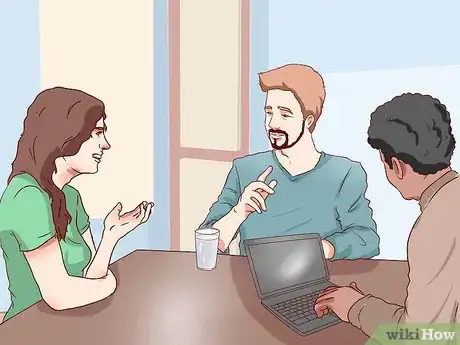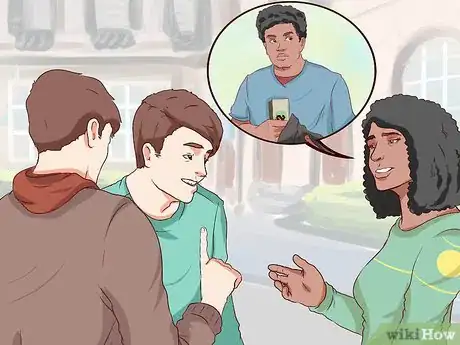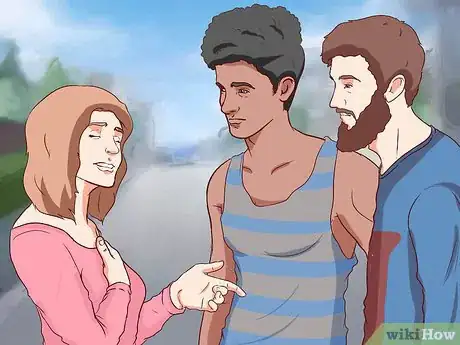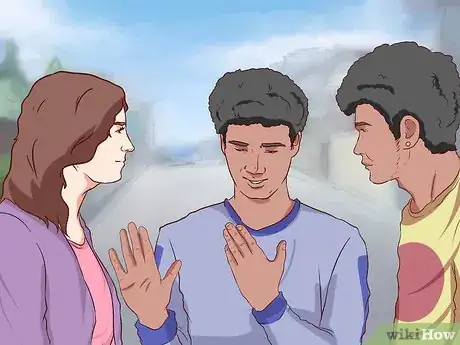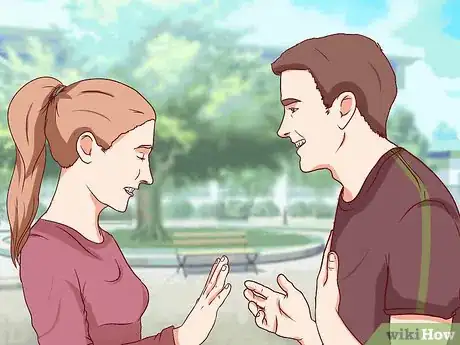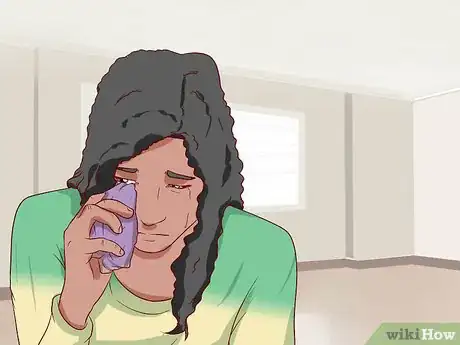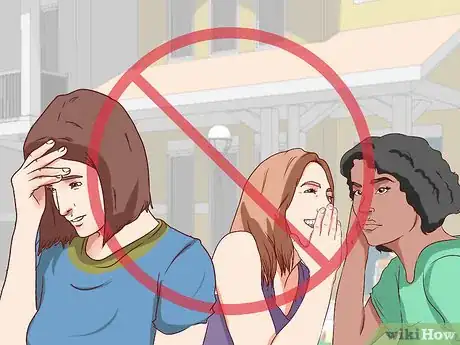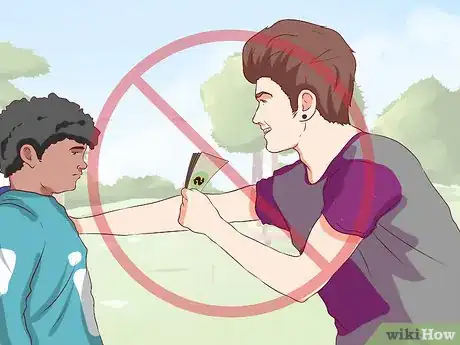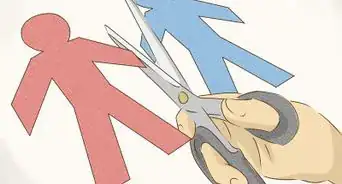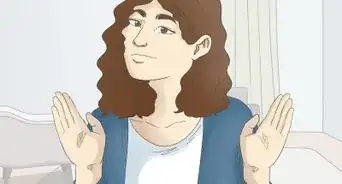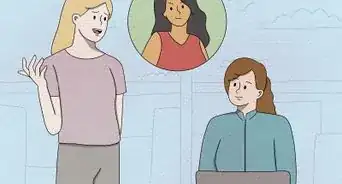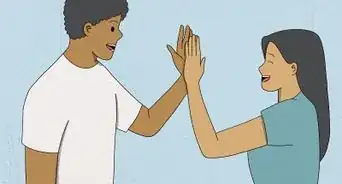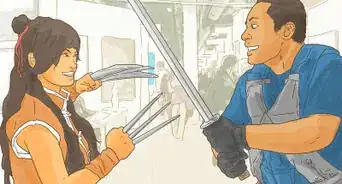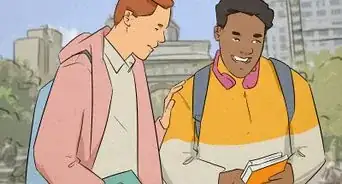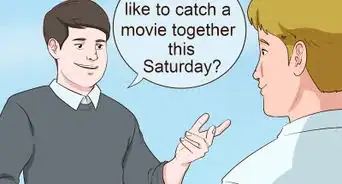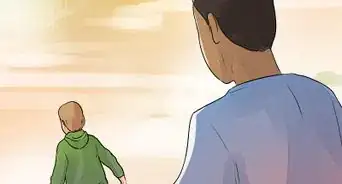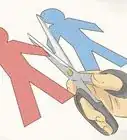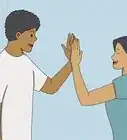This article was co-authored by Tracey Rogers, MA. Tracey L. Rogers is a Certified Life Coach and Professional Astrologer based in Philadelphia. Tracey has over 10 years of life coaching and astrology experience. Her work has been featured on nationally syndicated radio, as well as online platforms such as Oprah.com. She is certified as a Coach by the Life Purpose Institute, and she has an MA in International Education from George Washington University.
This article has been viewed 116,201 times.
Not all friendships are made to last. A toxic friend can drag down a whole group, creating stress and problems for everyone. Before taking action to end the relationship, make sure everyone is on the same page. You all need to agree this person needs to go. Then, decide how to end the friendship. You can taper off contact gradually or confront the friend directly. Have compassion. Many difficult people feel bad about themselves, so be open to giving your friend another chance in the future.
Steps
Forming a Plan
-
1Get together as a group to talk. You want to make sure everyone is on the same page. You should all get together to voice your opinions and decide what to do about the problem friend.[1]
- Let everyone know you want to get together to talk about the friend in question. This will give everyone a heads up so they can plan what to say.
- Pick the right time and place. Choose a time where no one has plans, so the conversation will not be limited by external deadlines. You should also choose a place where you all feel comfortable hanging out. If you all usually hang out in one friend's basement, for example, this may be a good place to talk.
-
2Identify the specific problems that you have with the person. Deciding to end a friendship is a big decision, so it is important to lay out your reasons for wanting to do so. As you and your friends talk, make sure that you are specific about the problems you are having with this person and why you do not want to continue a friendship with him or her.
- For example, if the person often tells lies to you or about you, then that is something you should share.
- Make sure that you provide examples of what happened, what you did, and how the friend responded.
Advertisement -
3Listen to everyone's input. You want to make sure everyone feels heard. Ending a friendship is difficult, and some people may have reservations about doing so.[2]
- Listen as much as you talk. If you feel strongly about something, you may be inclined to blurt out your feelings quickly. However, you need to allow others to participate.
- If you find yourself saying things like, "Let me talk before I forget what I wanted to say!" you may be dominating the conversation. State your feelings clearly and directly, and then ask for other people's input. For example, "So, that's how I feel about the situation. What do you guys think?" If you are being interrupted, calmly say "Please let me finish".
-
4Find out what your friends want to do. Keep in mind that some of your friends might disagree with you. While you might have had some negative experiences with this person, there is no guarantee that your other friends will feel the same way. Therefore, a compromise may be necessary to move forward.[3]
- If one or more of your friends still want to be friends with this person, then do not try to stop them or force them to see things your way. Just express your desire to end your friendship with this person and allow your friends to make their own decision on the matter.
- If your friends are all in agreement with you, then talk about what to do next. Do you want to end the friendship right now, or do you want to give the problem friend a chance to apologize?
- Remember that you cannot control who is friends with who. You can only control your half of your friendship with someone else.
-
5Decide if you want to end the relationship permanently. Your friend may ask for another chance or offer to change. You and your friends should make plans on how to handle this kind of situation together.[4]
- It can help for you all to consider the relationship. How much has this person hurt you? Does he or she have any redeeming qualities? If you all still care about this person, you may not want to permanently burn the bridge.
- Think about your relationship as a group. What qualities do you look for when letting friends into the group? Does this person have these qualities? If not, you may decide you are not willing to give him or her another chance.
-
6Recognize a problem relationship. You do not want to kick someone out who does not deserve it. Everyone can be difficult sometimes, and a friend who's causing problems may simply be going through something. However, some relationships are simply toxic and better off ended.[5]
- How do you feel when you hang out with this friend? Do you and your friends always feel drained afterwards? Do you dread inviting this person to social events?
- How does this friend treat you? Bad friends are very self centered. A bad friend routinely hurts other people's feelings without feeling remorse. They rarely acknowledge when your feelings are hurt, and want to win arguments more than they want to resolve a situation.
- If your friend has been difficult for a long time, it may be time to end the relationship. While everyone slips up from time to time, if the behavior has been ongoing for awhile, the friendship may be better off ended.
Ending the Friendship
-
1Confront the friend. If you decided a direct conversation would be best, have one. Get together with the problem friend and explain to him or her why you're ending the relationship. Use "I"-statements, which are statements designed to focus on personal feelings over objective judgements.[6]
- "I"-statements can feel less judgmental as you're not placing an outside judgement on the situation. You're simply stating your feelings. You begin with, "I feel..." and then state your emotion. From there, you explain the action that led to that emotion. Lastly, you explain why you felt the way you did.
- You may be inclined to say something like, "We don't want to be friends with you because you gossip about us when we're not there. That's mean, and we don't like it."
- As this sounds hostile, rephrase the statement using an "I"-statement. For example, "I feel hurt when you talk about me and other friends behind our backs because I feel like you should confront me directly when you're upset."
-
2Taper off contact gradually. If this friendship has not been going on for too long, gradually tapering off contact may be easier. You may not feel you owe this person a direct confrontation.
- You can be less direct with this approach. Simply don't invite this friend to group gatherings. If he or she asks you to hang out, say something like, "Sorry. I'm really busy this week." Do not engage too deeply with texts or online contact. Try to keep things surface level with somewhat generic responses like, "Cool!" or "Okay."
- The acquaintanceship will eventually fizzle out. However, in the event the friend asks you what is going on, you may want to gently explain you simply do not want to be friends anymore.
-
3Make a plan for awkward situations. These can occur if you run into the friend again at school or a social event. If you're from a small school or community, this is very likely to occur. You and your friends should all know how to deal with awkward situations when they arise.
- You do not need to be scathing. You may feel inclined to get revenge, especially if the friend hurt you. It is a bad idea, however, to be rude or confrontational when seeing a former friend.
- Just strive to be happy and in a good place. This is enough to get back on a bad friend. If you see him or her in public, be polite, but do not engage. Show the friend you are all doing better without him or her. Hopefully, your friend will learn how to treat people better.
-
4Be firm in your decision. It's normal to miss someone you were once close to. You may experience feelings of regret or unhappiness after cutting out a friend. However, remind yourself of why you ended the relationship.
- Why did you and your friends decide you did not want to be around this person? While there were probably good times, the bad times likely outweighed the good.
- Allow yourself to miss the friend, but work on being comfortable with your decision. You ended the friendship for a reason. Try to keep all the reasons in mind when you feel sad.
Having Compassion
-
1Give yourself time to grieve the loss. You can't expect yourself to end a friendship and walk away without sadness. You and your remaining friends should allow yourselves to feel sad in the aftermath.
- You can try to take action to help yourselves process. You can all, for example, write goodbye letters to the friend. These should not be letters you intend to send. They are just a means to vent your feelings.
- You may also want to plan a ritual. You and your friends can look through old pictures of the former friend together, for example, or watch movies and listen to songs that spark memories.
-
2Consider your former friend's perspective. This can help you forgive and move on. While difficult people are frustrating to deal with, oftentimes negative people have difficulties of their own. Try to see how and why your friend may have treated you poorly.[7]
- Consider times you were mean to other people. Ask yourself why you behaved this way. Chances are, you probably were not feeling good about yourself when you lashed out.
- Your friend may have issues with his or her own self esteem. It's not okay for anyone to treat you poorly. However, have some compassion. Understanding someone's actions better can help you take the mistreatment less personally.
-
3Make sure you're not part of a clique. If you and your friends made a decision to kick someone out, this may be a sign your group is turning into a clique. While having a friends group can be great for social development, cliques should be avoided.[8]
- Friends groups are brought together by common interests. You form friends groups with people you enjoy being around. However, with cliques, you do not usually have common interests with your friends. Instead, you come together as a means to gain control and power.
- Does your group have a leader? If so, does this leader try to maintain control over the group? Do you feel like you have to follow the rules of the group without making your own decisions? If so, you may be part of a clique.
-
4Do not engage in bullying. If you feel like your group is a clique, kicking someone out can be a form of bullying. Bullying can have serious consequences for the target. If your group kicked someone out needlessly, take action to stop the bullying.[9]
- Address bullying when you see it occurring in your group. Raise concerns about how you treat others. For example, "It's not okay for us to all send mean texts to Marguerite. I don't want to participate."
- Reach out to people in your school who are kind and compassionate. Form friendships with those who take your side when you stand up to bullying. This can help you form a healthier, more inclusive friends group.
Warnings
- It is perfectly okay to kick someone out of a group if they are engaging in negative behavior that's harming the rest of your friends. However, kicking someone out of a group arbitrarily can constitute bullying. This should be avoided.⧼thumbs_response⧽
References
- ↑ https://www.psychologytoday.com/blog/friendship-20/201509/7-ways-make-your-most-difficult-conversations-easier
- ↑ https://www.psychologytoday.com/blog/friendship-20/201509/7-ways-make-your-most-difficult-conversations-easier
- ↑ https://www.psychologytoday.com/blog/friendship-20/201509/7-ways-make-your-most-difficult-conversations-easier
- ↑ https://www.psychologytoday.com/blog/happiness-in-world/201308/how-end-friendship
- ↑ https://www.psychologytoday.com/blog/the-time-cure/201308/toxic-relationships
- ↑ https://www.psychologytoday.com/blog/friendship-20/201509/7-ways-make-your-most-difficult-conversations-easier
- ↑ http://greatergood.berkeley.edu/raising_happiness/post/how_to_deal_with_mean_people
- ↑ http://psychcentral.com/lib/click-or-clique-positive-and-negative-teen-social-groups/
- ↑ http://greatergood.berkeley.edu/article/item/eight_keys_to_end_bullying
About This Article
If you don’t get along with someone anymore, you can kick them out of your friend group subtly so they don’t get too upset. First, talk with the rest of the group to make sure you’re all on the same page. Then, gradually stop hanging out with the friend and inviting them to things so it’s not a sudden thing. For example, if you usually hang out 3 times a week, you could hang out with them once a week for a few weeks, then every other week, then stop hanging out with them altogether. If you go to school with them or it’s hard to avoid them, it might be easier to just tell them directly. Say something like, “We’re not trying to be mean, but we don’t think we have that much in common with you so we’d rather hang out in a smaller group.” For more tips from our co-author, including what to do if you bump into your old friend, read on.
